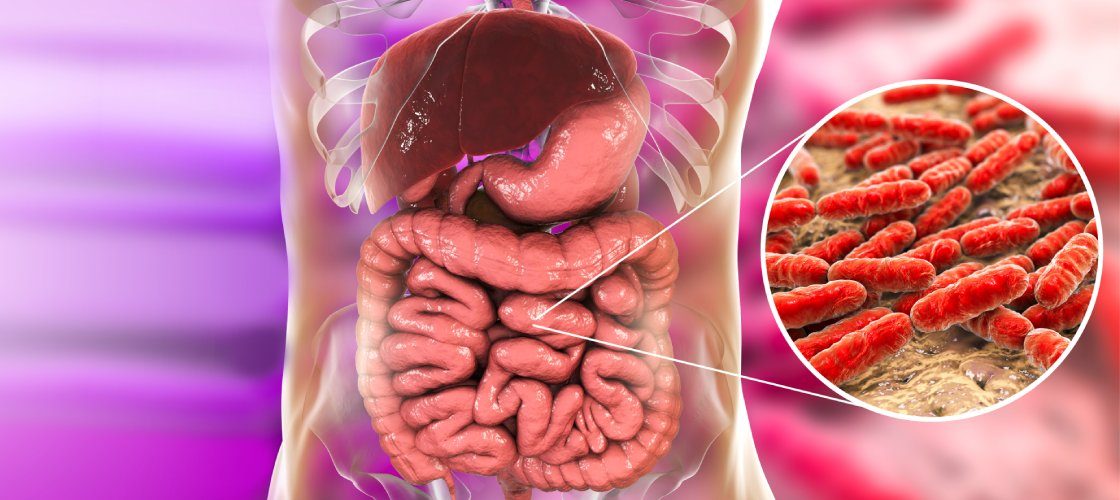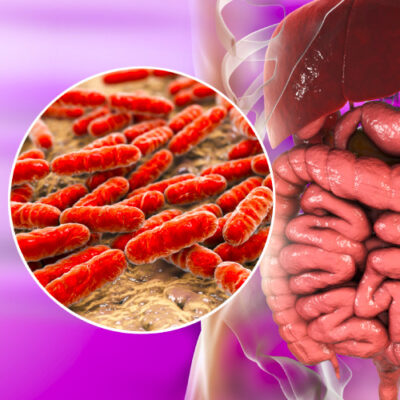Small Intestine Bacterial Overgrowth (SIBO) in San Diego

Bacterial overgrowth is a common condition that can cause significant impairment of digestion and absorption. This happens when intestinal bacteria, typically present in the body, begin to multiply excessively and interfere with normal metabolic processes.
One of the main signs of bacterial overgrowth is increased levels of hydrogen or methane gas in the gut, which are produced through a process known as fermentation. While these gases are not produced by human cells, they represent an abnormal gut bacteria response and may be an indicator of IBS.
Symptoms of SIBO
SIBO typically include:
- bloating
- gas
- abdominal pain
- cramps
- constipation
- diarrhea
- heartburn
- nausea
- malabsorption
and systemic symptoms like:
- headachejoint pain
- fatigue
- rosacea

While these symptoms can be troubling in their own right, they also have the potential to impact overall health by causing vitamin deficiencies and inhibiting nutrient absorption.
If you are experiencing any of these symptoms regularly, you may want to consider scheduling an appointment to get correctly diagnosed and receive appropriate treatment for SIBO.
To protect against SIBO, proper motility of the small intestine must be maintained. This is typically done through the migrating motor complex (MMC), a natural rhythmic movement that helps to flush out excess bacteria from the small intestine. Also, proper gastric and pancreatic secretions prevent stasis, allowing bacteria to grow more efficiently.
Another critical factor in preventing SIBO is proper ileocecal valve function, as this can help prevent the reflux of colonic bacteria into the small intestine.
Testing for SIBO
Doctors typically use a hydrogen breath test to diagnose SIBO or small intestinal bacterial overgrowth. This test measures the amount of hydrogen and methane gases emitted by the bacteria in the small intestine, using a particular sugar solution to feed the bacteria and provoke a reaction. The two most commonly used sugars for this purpose are lactulose and glucose.
To prepare for the test, patients must follow a special diet for at least two days before the testing process. Once ready, they will drink a solution containing one of these sugars, and their breath will be monitored to measure how much gas has been produced by the bacteria.
Overall, this method provides an accurate and reliable means of diagnosing and treating SIBO.
Improve Your Digestive Health Naturally
Book a discovery call with one of our experienced naturopathic doctors to learn how we can help.
Book your appointment in San Diego today!
Treatment of SIBO
Since bacteria use carbohydrates as their primary energy source, a low-carbohydrate diet low FODMAP diet can help to reduce the symptoms of SIBO.
By limiting the availability of carbohydrates in the diet, the amount of gas produced by harmful bacteria is significantly reduced.
Additionally, reducing the FODMAP foods may also help reduce overall bacterial load, as there is less food available for these microbes.
Many patients have reported experiencing rapid and significant reductions in their SIBO symptoms after starting a low-carb low FODMAP diet.

These diets typically eliminate grains, starchy vegetables, lactose, sweeteners other than honey, and beans to limit polysaccharides, oligosaccharides, and disaccharides.
Elemental Diet
Using an elemental diet to treat SIBO is a rapidly growing approach that is highly effective in reducing bacterial growth. Unlike conventional or herbal antibiotics, which only target specific strains of bacteria, elemental diets are powdered predigested nutrients taken in place of all meals for 2-3 weeks.
During this time, the nutrients in the diet provide nourishment while simultaneously inhibiting the growth and reproduction of harmful bacteria.
Studies have found that elemental diets reduce SIBO symptoms in 80-85% of cases, making them a competent and reliable treatment option.
However, it should be noted that elemental diets are not protein powders and should not be used as such. Additionally, they do not fall under the coverage of most health insurance plans. They must be paid out of pocket.

Despite these drawbacks, they remain a powerful tool for managing symptoms of SIBO and other gastrointestinal disorders.
Herbal Antibiotics

Whether used as a single agent or in a combination protocol at dosages at or above the typically recommended levels for 30 days, these herbs have consistently demonstrated their ability to treat SIBO effectively and efficiently. Thus, if you are looking for an alternative to traditional antibiotic therapy for SIBO treatment, look no further than the powerful benefits of herbal antibiotics.
Antibiotics
Rifaximin is one of the most widely studied and successful antibiotics for treating SIBO. It is a broad-spectrum antibiotic that is highly effective in combating harmful bacteria in the intestines.
In addition to its effectiveness against SIBO, rifaximin also has several unique benefits: it does not lead to yeast overgrowth; it decreases resistance among bacteria, and it is anti-inflammatory, which can help reduce inflammation in the intestine.
In some cases of SIBO, hydrogen gas may be present rather than methane gas, making it necessary to use a different antibiotic regimen. According to authoritative sources, rifaximin, in combination with neomycin, offers the most effective treatment when hydrogen is present.
Regardless of the specific antibiotic used for SIBO treatment, breath testing is generally required to ensure that it works effectively and targets the microbes that are responsible for causing SIBO symptoms. Ultimately, this ensures that patients receive an optimal treatment plan and experience improved digestive health.
Prevention of SIBO
SIBO, or small intestine bacterial overgrowth, is a disease that can be difficult to treat due to its tendency to relapse.
While it is possible to eradicate the bacteria causing SIBO successfully, this does not always lead to a complete resolution of the symptoms associated with the disease.
This is thought to be partly due to an underlying cause of SIBO known as a deficiency in the migrating motor complex. This process stimulates movement in the digestive tract, helping to keep harmful bacteria out of the body’s main organs and keeping balance in the gut flora.
There are several ways to address this underlying cause and improve motility in patients with SIBO. One popular approach involves using prokinetics like low-dose naltrexone or herbs such as ginger, or even acupuncture, which have been shown to regulate motility and improve digestion. A trial removal of these prokinetics after at least three months is often suggested.

Still, many patients need long-term use of these medications to manage their condition fully. Whether or not ending use must eventually be done will depend on each patient’s response, so it is best for patients and their medical providers to work together closely throughout treatment for optimal results.
Next Steps
Once the overgrowth has been successfully eliminated, and any minor intestine damage has healed, you may want to expand your diet to include a wider variety of foods.
Depending on how well you tolerate these diets, you may choose to adopt the Cedars-Sinai diet or another lower-carbohydrate eating plan.
Whether or not you pursue a lower-carbohydrate diet long-term, you must continue working closely with your doctor or another healthcare provider to ensure that your symptoms do not resurface.
You can successfully manage bacterial overgrowth and prevent its return through proper nutrition and care.
Ready to schedule an appointment?
